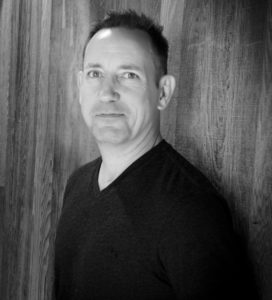
As a founding member of one of the biggest and most ambitious rock bands of the “Alternative” era, the Smashing Pumpkins, Jimmy Chamberlin made his mark as an emotive and inventive drummer. More recently, Chamberlin has explored his jazz roots with his ensemble the Jimmy Chamberlin Complex, which just released its second full-length album The Parable. An improvisational, collaborative and spiritual set, Chamberlin embraces the spirit of the jazz greats, and sets his distinct and dynamic drumming free.
Elmore writer Jamie Frey had a far-ranging conversation with Chamberlin, who talked about jazz, the music business, his fellow musicians and playing in arenas and dives, among other topics.
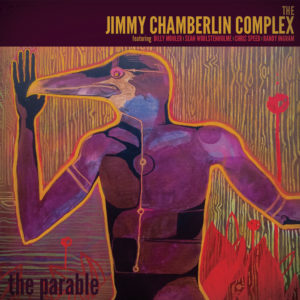 Elmore Magazine: Let’s talk about The Parable. It reminds me of one of my favorite records, A Love Supreme by John Coltrane. Tell me about your jazz in your life.
Elmore Magazine: Let’s talk about The Parable. It reminds me of one of my favorite records, A Love Supreme by John Coltrane. Tell me about your jazz in your life.
Jimmy Chamberlin: Interestingly enough, at least from a listening perspective, that’s where I came from. My dad played the clarinet. The music in my house was very much Duke Ellington, Count Basie, Benny Goodman, that kinda stuff. I’m also the youngest of six kids so growing up in the late 60’s, early 70’s, my older brother Paul is a musician, my sister Laura was very much a jazz buff so we had a lot of that music in the house. Growing up as a young drummer, I was just really drawn to the free expression in and around that music and, as drummer, I really got into Elvin Jones, Tony Williams, that type of stuff. Later on, more of the Return To Forever, Weather Report kinda stuff and I think that was more influential on my drumming than a lot of the Rock stuff that I was listening to and when you listen to the Pumpkins, a lot of that sensibility is what set that music apart.
EM: I think that listening to the records now, after spending years listening, there’s a thing that separates you is that the dynamic shifts you are able to put in rock and pop songs are not like other bands.
JC: We approached that, or at least I did, from a jazz headspace. A lot of that contrast comes from things like “A Love Supreme,” “Giant Steps,” Tony Williams’ Lifetime. Things that as a dynamic musician you’re always attracted, I think that to propel the emotional foundation of songs in a way that you don’t really hear in a “rock” context that often.
EM: Were the other Pumpkins into jazz at all?
JC: Billy is a huge jazz fan as well. He’s a huge Ornette Coleman fan, he’s a huge Charles Mingus fan. We were both into Thelonious Monk, but also a fan of more contemporary songwriters that came out in the ’40s and ’50s; Cole Porter, Rodgers & Hart. Those type of song constructions we were really into as well. We were just students of any type of music that’s compelling. We would sit around and listen to three hours of Fela Kuti, just to mine something out of it or sit around talking about Monk or Gershwin. All of that was fuel to the fire of the Pumpkins, which subsequently because the stuff I’m attracted to now from a playing standpoint.
EM: What are your favorite standards to play?
Obviously I love playing the Coltrane stuff, things like Impressions that are more modal that allow a stream of consciousness and freedom of expression. I play with a few different Jazz ensembles in Chicago, it’s everything from Eddie Harris to “Stella By Starlight.” those types of things where they’re all great vehicles for expressions. The great thing about those songs, is something we’d say in the Pumpkins, a great song shouldn’t be dependent on the instrumentation. You should be able to pick up a ukulele and play a great song and it should still be a great song and that’s how the jazz standards are as well. You can play “Blackbird” or “Stella” or “Giant Steps,” it all holds up no matter what the instrumentation.
EM: Tell me about the amazing players on The Parable.
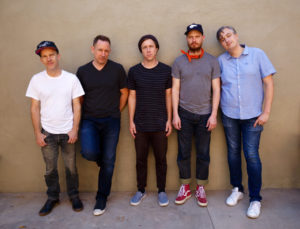
Billy Mohler and I have been friends for almost 20 years. I met Mohler when we were doing the Zwan sessions out here in L.A., he was one of the bass players that audition and just by the nature of his resume, we became great friends. So when I did the first Jimmy Chamberlin Complex record, him and I were the core of that group along with Sean Woolstenhulme, who we added later, and then Randy Ingram and Billy have been friends for a long, so the three of us had been talking about doing something for a long time so this was an opportunity and then Billy had been doing some gigs with Chris Speed and I’m obviously a huge fan of Chris’s and really love the stuff he did with Dave King and The Bad Plus. Everyone was available. I found myself in L.A. and we had a free date to go do the stuff. We had been kicking around the compositions, oddly enough via text message. Billy had some motifs on the bass, Randy had some fragments compositions we had done so we had some loose sketches of the songs but we had never played together as a band or rehearsed. The record is really a document of the first day we had played together, which freaked a lot of people but in the jazz world it’s not uncommon to not rehearse or no be friends with someone you’re onstage with. Jazz is more a product of listening, I had known enough about everybody’s music and where they were at as a musician, to have a good idea of what it would sound like in the studio. Everyone is responsible enough to show up prepared, so we just rolled tape, so to speak, and that was it.
EM: The record feels like you are summoning spiritual motifs, and you can hear the inspiration you had playing together?
JC: This record became less about soloing and that kind of demonstrative playing and became more about being components of the bigger, which for me is a lot of fun. I enjoy being a passenger than a driver in some of the stuff I do outside The Complex, sometimes it’s good just to let someone else do the driving and be a complementary, compassionate force alongside something as opposed to something everyone else is reacting to. So for me, it was really a unique and cool opportunity to take on that role.
EM: What other music are you playing of late?
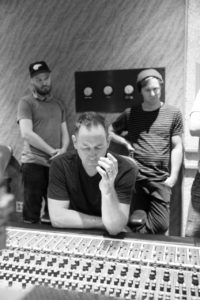
I play with this guy Frank Catalano from Chicago, a sax player, I do around 10 gigs a year where we play The Green Mill or Andy’s, those types of gigs. We’ve got a rotating cast of musicians, we played in New York, we play the Iridium once in a while, we play with John Benitez on Bass, Theo Hill from Mingus big band, Vic Juris the guitar player from The New School, who’s amazing. We took that act to Japan and played the Cotton Club over there, that’s more standards based, somewhere between Chicago jazz and your basic standards. I play wherever I can, if somebody calls me, I’m not all like “I’m Jimmy Chamberlin from Pumpkins.” I did a gig with guy John Moulder, a guitar player from Chicago, just a supper club gig from 5-9, it was great. He plays a lot of stuff in odd time signatures. Basically, anything that gets me out of my comfort zone, I enjoy.
EM: I grew up with Pumpkins on the radio, it is now kind of a “Classic Rock” for people my age, and there are younger people discovering the music. How do feel about this 90s nostalgia that is occurring right now?
JC: I think the ’90s was an important generation of music. Intellectually, there was a lot of cool stuff going on. When you look at popular art historically, it’s always gonna be a reflection of the intellectual capacity of the consumer base, right? And the great thing about the “90s and at least with The Pumpkins, was the fans, yourself included, there was an intellectual movement that supported the kind of sophisticated music we were doing. Our fans were reading Nietzsche, reading Dostoevsky; there was this whole kind of intellectual literary movement that supported the music we were making. I think that was one of the last times that really happened. In the 60’s people were pushing the envelope as far as information, trying to find new and interesting ways to explore their inner selves and the music was reflective of that, so when I look back at the 90’s I see an opportunity to be seized to move that music forward and that makes me feel good about the importance of that music.
Now you’re in this whole kind of anti-intellectualism movement, there has been this kind of dumbing down culturally, which then subsequently, will be reflected in the music. And not to sound like an old guy, who is like “oh, things were better than, It’s just, for me as a player, was more interesting. Am I interested in going back and rehashing that stuff? Absolutely not. I’m cool to just play. Whatever I’m into today, I’m into. I think there’s a way of celebrating that music that’s earnest and relevant but not rooted in replication.
EM: I try and explain to younger friends, what it was like hearing all this music on the radio during the “Alternative” era, with all these disparate influences: classical, new wave, reggae, electronic, all in the same 20 minutes of radio. It was such an intellectually open space to hear rock music that doesn’t exist anymore.
JC: I think back then you still had the last vestiges of the music business where the music was catalyst for the business, and I think at some point it started to become the business of music, for what kind of musical choices people were making. That’s how I between those two platforms. For me, going back to the jazz stuff, to be a musician is to play music, and not to play music predicated by economic reasons. When I play jazz gigs, I don’t take money, I play because it’s a challenge to do it and it’s a vehicle for self-expression, much like when I joined the Pumpkins in ‘88. The goal wasn’t to go make a lot of money, it was to have a cool band, and make cool music, and have a vehicle for self-expression. That stuff would have happened with our without the economics. People ask me “What would you be doing instead of playing in front of 20,000 people tonight?” and I always tell ‘em “I’d be playing some dump for free.” My Dad always said, “It’s not a job, it’s a sickness!” You gotta go do it. He had a regular job but he played his clarinet all the time, a nauseating amount of time. Jesus Christ, man! That’s just what we do. Once it became a commodity, the motivation began to change. Not to say that being a rock star wasn’t a motivation, when I was a kid I used to dream about it. It wasn’t the reason I practiced, and it’s not the reason that today, I wake up in the morning and practice every day. I’m not a musician, it’s not like music is my business.
Some of my greatest moments as a musician have happened at 8:30 in the morning at my practice. It’s not like “I met some girl and blah blah.” That’s the fantasy, but the reality is that those sacred moments happen in solitude generally. It’s about the journey, right? The easiest way to quantify it is: it’s about the journey in real time, it’s not about projecting into the future or celebrating the past. Life in music is living in the present time and painting in real time, which I said before, what jazz allows you to do.
EM: You started playing out really young, right?
I quit school when I was real young, 15, and just started gigging. I was playing an incredible variety of stuff. I was playing in a rock band, who were very progressive. I was playing on a Polka Television show, I was playing on a Polka radio show on Sundays the later, I played with a ten piece variety show band that was doing “West Side Story” and those type of things, I was doing that right up until I joined the Pumpkins. When Corgan came to some street fair to see my show band, he was just mortified. We were playing a whole Beach Boys set, cool music, but it was not cool.
There was definitely a cultural delta between those three and myself. I was a jobbing musician. Billy was working at a record store. The other two were going to college. I played music for a living, I didn’t have a job and then music was my “fun” thing. Music was my skill.
EM: A cool thing happens when there’s an intersection between someone like yourself who approaches the skill of musicianship as a singularity and then people who have an art background. Playing in groups there are so many different philosophies that can intersect, when you get into conceptual things, art and literary influences to create style you’ve never heard before.
JC: I think the Pumpkins, we were all pretty smart people. We were all well read. I went to Catholic school and really to this day enjoy reading. I’m an information hound. Billy is very much the same. We were kind of students of life in a way that manifested in a great vehicle like the Pumpkins.
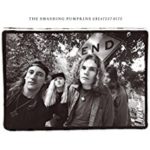 EM: What were the influences you guys shared as a group to create the style of the Smashing Pumpkins.
EM: What were the influences you guys shared as a group to create the style of the Smashing Pumpkins.
JC: At the beginning, not a lot. I came from a jazz background, my influences were Tony Williams, Jeff Beck, Return To Forever, Weather Report. Billy was very much into Joy Division, New Order, Bauhaus, those types of bands, but also was a closet Mahavishnu fan, and really liked that Yngwie Malmsteen stuff, progressive rock. James Iha was really into Johnny Marr, and D’arcy had her own trip as well. Later on, I think we all got swept up in being attracted to our contemporary, there was a point where all the kinds of bands we were in a “family” with, were pushing the envelope of rhythmic and syncopative possibility, certainly Soundgarden and Jane’s Addiction, those types of bands, where we felt like we were coming up together. As time went on, our attractions began to congeal, but in the beginning it was our disparate components that was the fuel for the fire. Billy was really into my interpretation of that type of music and really wrote to that playing. He purposely wrote songs that would allow me the freedom to do what I was capable of doing, and really encouraged me always, even today he’s always like “whaddaya got? I know you’re sitting on a bunch of crazy shit. Let’s hear it.”
That’s why the band was attracted to me, the Bauhaus, R.E.M. type stuff. That wasn’t gonna get it done for me. I wasn’t gonna stick around for a band that just played 2/4. Once we started to explore the kind of outer reaches of our abilities, that’s when it became interesting.
JC: Do any of the Pumpkins recordings stick out to you as favorites?
That could change five times a day. It’s an unanswerable question. The Machina stuff was probably the stuff most in alignment with the ideology of the band and what we were on about, it probably came the closest sonicly and arrangementally to what we heard in our heard, but that doesn’t mean anything other than what I just said.
EM: Do you talk to younger drummers? What would you to say to a drummer starting out?
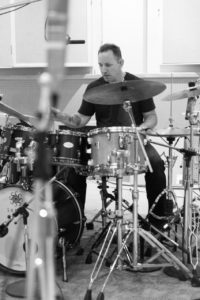 JC: We’re in an interesting spot as far as how music is learned. Music has become a visual thing and not this sonic thing. It’s easy to go on YouTube and just replicate what you’re seeing. So a lot of drummers that I hear play, they have the ability to string together these blistering chops. They have the “how” and “what?” but what’s missing is the why? Right? The emotional context for why we’re doing what we’re doing that is missing sometimes which can lend to homogenized playing, especially when you’re playing to click and gridding it out. There’s this propensity to be more conformist, where for me the great musicians of all times are the ones who are able to celebrate the inconsistencies and idiosyncrasies in their playing and have it become part of their identity, making their playing instantly recognizable. I think young guys need to be OK with what they’re doing, OK with what makes them unique and not trying to be like someone else and as precise as them. Music should be the celebration of the individual and not the replication of somebody else. I think YouTube shows us how to play like other people, and to me, listening helps us figure out what we want to say and how we’re gonna say it. The how and what, that’s always been like, drum acrobatic stuff. For me it’s about painting emotions on the drum set and being OK with things that are inconsistent with uniformity.
JC: We’re in an interesting spot as far as how music is learned. Music has become a visual thing and not this sonic thing. It’s easy to go on YouTube and just replicate what you’re seeing. So a lot of drummers that I hear play, they have the ability to string together these blistering chops. They have the “how” and “what?” but what’s missing is the why? Right? The emotional context for why we’re doing what we’re doing that is missing sometimes which can lend to homogenized playing, especially when you’re playing to click and gridding it out. There’s this propensity to be more conformist, where for me the great musicians of all times are the ones who are able to celebrate the inconsistencies and idiosyncrasies in their playing and have it become part of their identity, making their playing instantly recognizable. I think young guys need to be OK with what they’re doing, OK with what makes them unique and not trying to be like someone else and as precise as them. Music should be the celebration of the individual and not the replication of somebody else. I think YouTube shows us how to play like other people, and to me, listening helps us figure out what we want to say and how we’re gonna say it. The how and what, that’s always been like, drum acrobatic stuff. For me it’s about painting emotions on the drum set and being OK with things that are inconsistent with uniformity.
The thing that all of us have is our fingerprint. We all have this great gift of individuality, but often times we find a lot of people running from that or categorizing that individuality as less valuable than something else when, in my opinion, it is those inconsistencies in playing that allow me to identify what’s beautiful about anything. Look at anything from Da Vinci to Elvin Jones. There’s stick clicks and there’s brush strokes, shit that’s propped up about it but it that’s what endears the human spirit and allows others to look at art and say, “It’s OK not to be perfect, it’s OK to be what god put in the mold and move forward with that as opposed to this kind of homogenization that seems to be rampant music right now.”
EM: I think sometimes as technology moves forward, we’re losing the beauty of the flaw
If you take this article and put it through some Google algorithm that’s gonna rearrange the words and punctuation and make it all perfect, if everybody does that then who the fuck wants to read that? Often that’s what you hear sometimes when you hear gridded-out ProTools music on the radio. There’s only so many algorithms, there only so many kinds of beats out there. For me, I wanna hear people making chances.
EM: You wanna hear freedom on the recording. In the 1960s, people were thinking about freedom and making records about it.
JC: From a technology standpoint, you could be someone who looks at technology and uses it without fear like Brian Eno, who takes technology and uses it as just another paintbrush and opposed to a crutch. You listen to some of the Eno stuff where he’s experimenting with technology where there’s a beauty to it where it’s like this is an extension of an emotion as opposed to, this is gonna fix what’s wrong with this composition. If you’re gonna use quantization if you’re gonna make something incredibly uncomfortable to listen to, fine that’s an art form, but if you’re gonna use it to make it sound like everything else, that’s not an art form.
–Jamie Frey
Connect with the Jimmy Chamberlin Complex on FACEBOOK or INSTAGRAM
Buy The Parable HERE


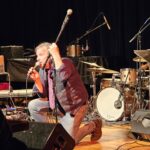




Jimmy Chamberlin and Billy Corgan are two of the best musicians alive today, I know as an super fan that may come across as biased but I do truly believe it, and while Machina is definitely a unique masterpiece, imo the best album (and best double album of all time, “The Wall”…What’s that? Definitely my least favorite PF/Roger Waters solo record…go buy “Meddle” or “DSotM” instead) they put out was MCIS.
As a musician myself I can say that I have been influenced heavily by BC and SP, set aside the vocals, set aside the masterful guitar work, and what you have left is a genius songwriter, I have been influenced more so by the song craft than the musicianship (although I have been a little, Billy is quite the guitar player and has some very unique approaches to playing…plus he has killer ass style as a guitar player).
So other than gushing over these guys I just want to tip my hat to the SP because without them I don’t think my life would be the same, they are the soundtrack to my life and they should be the soundtrack to yours!
Do yourself a favor and go buy (don’t steal it, support them) their discography (I just picked up MCIS on vinyl and it is bonkers) on vinyl and turn it up loud and turn it up often!! They never disappoint!!!
Oh, I also even named my home studio “GhoulLand” after “Sadlands” (Billy’s home studio)
you’re alright, bud. I’ve been a fan since 92 and it’s good to see another
[…] Smashing Pumpkins solo album, but it was the first to crack open a seldom-grasped truth. Thanks to Elvin-and-Tony-steeped drummer Chamberlin, the ‘90s alternative heroes were saturated with […]